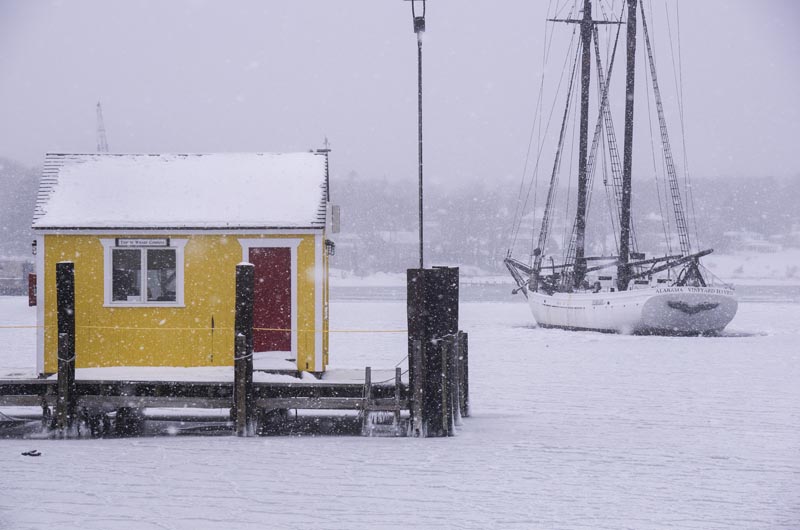Boston celebrated (or bemoaned) a record amount of snowfall this year. And while the Vineyard hasn’t broken the record snowfall of 67 inches in 2005, it has come close at 52.8 inches, as measured at the Edgartown cooperative weather station. This is more than twice the Island’s average snowfall amount of 23.6 inches.
The winter was marked by two significant storms that came within three weeks of each other — a late January storm that brought approximately 20 inches of snow over two days, and a mid-February storm that brought about nine inches over two days. Total February accumulation came in at 22 inches, and March has seen about 10 inches of snow thus far.
The storms cancelled schools, closed businesses and eclipsed many snow removal budgets as plows worked around the clock. The weather also kept emergency management director Chuck Cotnoir awake many a night as he and his fellow emergency workers alerted Islanders about dropping temperatures, blinding snow, shelter openings, school closures and driving bans. The winter was a tough one, Mr. Cotnoir said in a recent interview, and January’s blizzard was the worst he can remember in more than two decades on the job.
“The amount of snow, and the succession of snow,” he said. “We were fortunate that we didn’t have any roof collapses.” During one of the storms, the county emergency management department stayed open from Friday through Tuesday to help keep Islanders up to date.
Dukes County is a supporting agency for the six Island towns as well as Gosnold, and the department works to offer resources to the towns so they can best plan for potential disasters. But one of the most important resources is information, and that’s where Mr. Cotnoir comes in. His job is primarily one of coordination and dissemination, creating contingency plans and asking what if?
It’s a considerable time commitment, and Mr. Cotnoir spends from 20 to 30 hours a week at work. It’s all volunteer time.
“The emergency managers have seen the need for a center of communications,” he said. “Most of them are very busy, so they send the information to me, and I push it out to the other towns.” He developed a website that hosts all of the updates, and created the Friends of Dukes County community, a group of people and organizations that have requested to join the information loop. Before summer, Mr. Cotnoir typically sends out updates about preparing for heat-related issues and hurricanes. Before winter, the focus is on preparing for cold and snow.
“You always have to think about what’s the worst-case scenario,” Mr. Cotnoir said. “As an emergency manager, that’s your job, and you have to do it well in advance.”
The job is made easier by technology. When Mr. Cotnoir first became a volunteer for the county emergency management department in 1992, cell phones and the Internet were barely used.
Mr. Cotnoir spent 33 years in the Air Force, and public service is second nature.
“When you spend more of your life doing missions, you just kind of continue doing it,” Mr. Cotnoir said. Most of his Air Force career was spent in the reserves, but the nature of that particular reserve corps means he still spent more than 300 days a year doing missions.
“As a flyer, you’re not doing [just] one weekend a month,” he said. When Mr. Cotnoir retired, he was a senior master sergeant and had logged about 4,643 hours in the air.
The Air Force was Mr. Cotnoir’s entry into emergency management, and he was appointed a liaison to the Federal Emergency Management Agency’s regional director for Boston (region 1). While in that role, he coordinated moving FEMA supplies and equipment through the Air Force base in Westover. He later moved to the Massachusetts Emergency Management Agency in Framingham.
Mr. Cotnoir became the county emergency manager in 1994, after joining the department in 1992. There are few full-time volunteers now, a need the emergency managers are all working to address. But Mr. Cotnoir said the Vineyard is now “on the right path towards response and recovery.”
Another area of concern he said is the growing elderly population on the Vineyard, which is one of the more vulnerable groups during disasters. Mr. Cotnoir is part of the Island’s medical reserve corps, which is beginning to address how seniors fare during storms and other emergencies. That conversation was sparked by an experience corps director Beth Toomey had during a blizzard a few years ago. While working in a crowded shelter in Falmouth that had taken in people from around the Cape, she realized that nearly all of the people there were senior citizens, and few had come prepared for their stay. Many hadn’t brought their medications.
The emergency managers work to educate people, helping them develop personal worst-case scenario plans, and continued collaboration remains essential, Mr. Cotnoir said, particularly because the Island is more isolated than other parts of the state.
“To a certain extent, MEMA does the same thing [as the county’s department],” Mr. Cotnoir said. “Their job is to provide resources, manpower, that sort of thing, when your local runs out. But they’re a long way away from here.”
Mr. Cotnoir sent out another alert early Thursday morning, warning of possible snow Friday night and Saturday. Happy first day of spring.
Mark Lovewell contributed reporting.





Comments (6)
Comments
Comment policy »